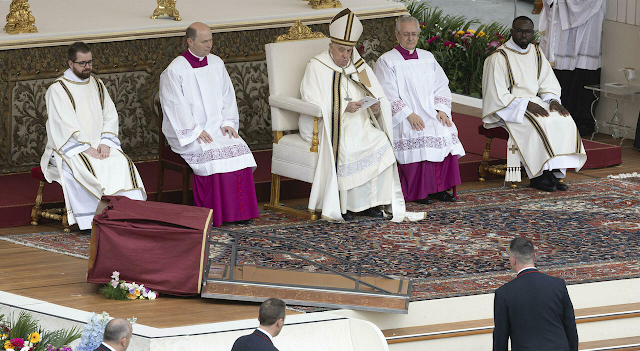The fallen Christ the Redeemer in front of Pope Francis, what does it mean? Omens and alleged mysterious signs.
A certainly unforeseen anomaly that has inevitably been juxtaposed with other signs that have occurred in recent years coinciding with major Vatican changes
[Main excerpt]
On Easter Day, during Mass at the Vatican, a gust of wind more powerful than the others caused the ancient icon of the Christ the Redeemer on the courtyard facing St. Peter's Basilica to fall ruinously to the ground. Two attendants immediately intervened to put back up the heavy support that had collapsed just a few meters from the Pope during the Easter ceremony. An anomalous and curious episode on which many have dwelt trying to identify messages, as if that fact could be a heavenly sign, capable of unveiling future events.
A certainly unforeseen anomaly that was inevitably juxtaposed with other signs that have occurred in recent years coinciding with major Vatican changes. For example, the famous lightning bolt that struck the large iron cross located on the top of St. Peter's in 2013 on the very day on which the then pontiff Benedict XVI renounced the throne of Peter to retire to private life on the Vatican Hill. It was February, it was pouring rain, and that eerie image taken by the Ansa photographer on a stormy day immediately went around the world, symbolizing a historic, almost apocalyptic moment with a prophetic meaning for many.
In the list of emblematic images captured by the lenses of photojournalists but also by the cell phones of ordinary believers there are some rather curious ones that when viewed in retrospect, at a distance of time, actually seem to warn of impending radical changes or important transitions. During the conclave on the Vatican square - for example - a never-before-seen individual, dressed in a Franciscan habit all tattered, barefoot, was glimpsed wandering through the crowd. The man stood praying motionless under the cold drizzle of those days.
Then, a short time later, there was the release of the dove of peace during an Angelus that was immediately attacked and mortally wounded by a crow and a seagull while in flight. And again. During a solemn mass in the square, one of the curial cardinals fell from his chair and ended up on the ground, becoming a symbol of a curia that would shortly be turned inside out by Bergoglio's draconian action. At that time he was preparing the reform to give a new structure and renewed rules to the apparatus, erasing old secular privileges and resetting many customs to zero. A strong move that had enormous backlash across the Tiber.
And again: the doves that were released during the Pope's trip to Armenia on the Turkish border. The birds inexplicably returned. Francis was in the medieval monastery of Khor Virap, together with Armenian Patriarch Karekin II. To the surprise of those present, the birds advanced through the air for a few meters, circled and then inexplicably turned back. They would not hear of crossing the border. Peace with Turkey and the Azerbaijanis would never come; indeed, war events were being prepared even then. Then it was the turn of the sudden collapse of the roof of the Carpenters' Church near the Capitol, a sacred building entrusted to the Jesuits and dedicated to St. Joseph who is the patron saint of the Church. Fortunately, the disastrous collapse claimed no lives, yet questions about the metaphysical significance were not long in coming on that occasion either.
FUNERALS
Before that, during previous pontificates, two episodes gave pause for thought.
The first occurred during the funeral of John Paul II. The Church was coming out of a very long pontificate that had lasted more than 20 years. On the square, a heavy Gospel Book was placed on the rough wooden coffin, which suddenly, due to a gust of wind, opened up and it seemed as if the wind was turning the pages as if to tell that the spirit of the Word would continue to fly and travel beyond time and space, spreading to the four winds. Shortly thereafter, Joseph Ratzinger having been elected, during the first scheduled trip (World Youth Day in Cologne, Germany) witnesses recall an eerie sign. The wooden WYD cross that had been fixed permanently on the barge that was sailing down a stretch of the Rhine with the new pontiff and some young people on board was literally broken in two by a gust of wind.
